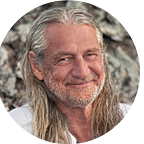Yoga has profound implications for our social disorders and brings kindness as the principle of social life.
How to Change the World: 3 Steps for Global Mental Health
Mark Whitwell | Yoga Teacher at Heart of Yoga
Daily the reports are coming in of young people and adults struggling with mental distress. According to the latest State of the World’s Children report from UNICEF, 13 percent of those aged between 10 and 19 suffer from a diagnosed mental health disorder.
Deep compassion for everybody out there who is trying to make society work. But it is clear now that the social frameworks we have inherited for understanding a human life are simply not working. In the yoga traditions it is said that when duhkha (suffering) reaches a certain point there is no option but to change.
So what is the change that is required?
Three steps are required to see a turn around a culture of dysfunction and restore a life of intimate connection and wellbeing to all.
One. We recognise and release the deep cultural pattern of dissociation from Nature that spread around the world through European colonialism and presently affects us all. Patterns in which our inherent connection to the cosmos — the Mother — is denied; in which there is a subtle or gross sense of separation from oneself, others, and the Cosmos. So much mental distress is caused by the presumption of being separate from life and somehow needing to find a way to get back to a lost connection.
All the methods of the religious and New Age world — yoga, meditation, breath-work, ritual — are beginning from the “I am separate” conditioning.
The idea of separation from Nature is just that — an idea! An intellectual mistake with no actual reality to it. There has never been any separation in the first place. Think about it. What is sustaining your body? What is your body? If not the beauty, harmony, power, and inherent peace of the natural world.
Therefore there are no steps to be taken. This understanding alone allows a person to let go of the stresses of a culturally prescribed search, relaxing instead into the natural state and wonder of Life already given.
Two. We move and breathe in the One Reality that is All. By the gentleness of daily yoga practice, we can learn to participate in the inherent connection to Nature that is already there. If there is any momentum in the mind of cultural patterns (samskara) then yoga is a supremely useful practice. Yoga is to receive what we need, and to release what we don’t need.
This kind of intimacy with ourselves and others is what allows for emotional digestion. The breath moves us through the sequence of emotions without getting stuck in any particular stage. We move from numbness to fear, anger to pain, grief to compassion, forgiveness and love. At each stage we can predict the next fundamental emotion or the cause of the emotion we are currently in. We ‘get to grief’ as quickly as possible.
People find that when they start caring for themselves through a simple yoga practice, they spontaneously they become kind to others. It is really an act of kindness to your own life. It is the kindest thing you can do for yourself is to move and breathe, be kind to your own body. This yoga that we do is the love of Self, the love of Life, capital S Self — Life Itself. If I love my life then I can spontaneously love you. Yoga has profound implications for our social disorders of hard heartedness and brings kindness as the principle of social life.
Three. We turn the Secular over to the Sacred. Intimate connection to life, to the nurturing source of existence, to the harmony of the cosmos, is obviously the birthright of every person. We all deserve to feel our life as an integrated and deeply loved part of the Whole. Humanity’s political institutions and religious structures must be given over to supporting Life in all its forms, and bringing intimacy into our communities rather than working against it.
It will take the foresight of secular leaders to see the sacred, to see that Life is a Unity that transcends point-of-view and tribalism. Their support of the process of public yoga education will save humanity. The need for a cultural transition to a sane life of intimate connection, free from cruelty, grows louder every day. May the world leaders of religion, commerce, and politics hear what is available from the wisdom traditions of humanity.
Get Involved
In January 2023 the Heart of Yoga Foundation was launched as a global vehicle for bringing the tools of yoga to local communities. The foundation includes the Peace Project: an initiative to bring yoga into conflict zones as a profound tool of reconciliation and healing; Yoga in Schools: an initiative to equip teenagers and teachers with simple practices to help them navigate their busy lives; and the Yoga Teacher Equity Fund: a resource for teachers from financially disadvantaged backgrounds to attend teacher trainings and courses.
If you would like to donate or lend a hand to any of these projects please visit the heart of yoga foundation page.
Mark Whitwell
